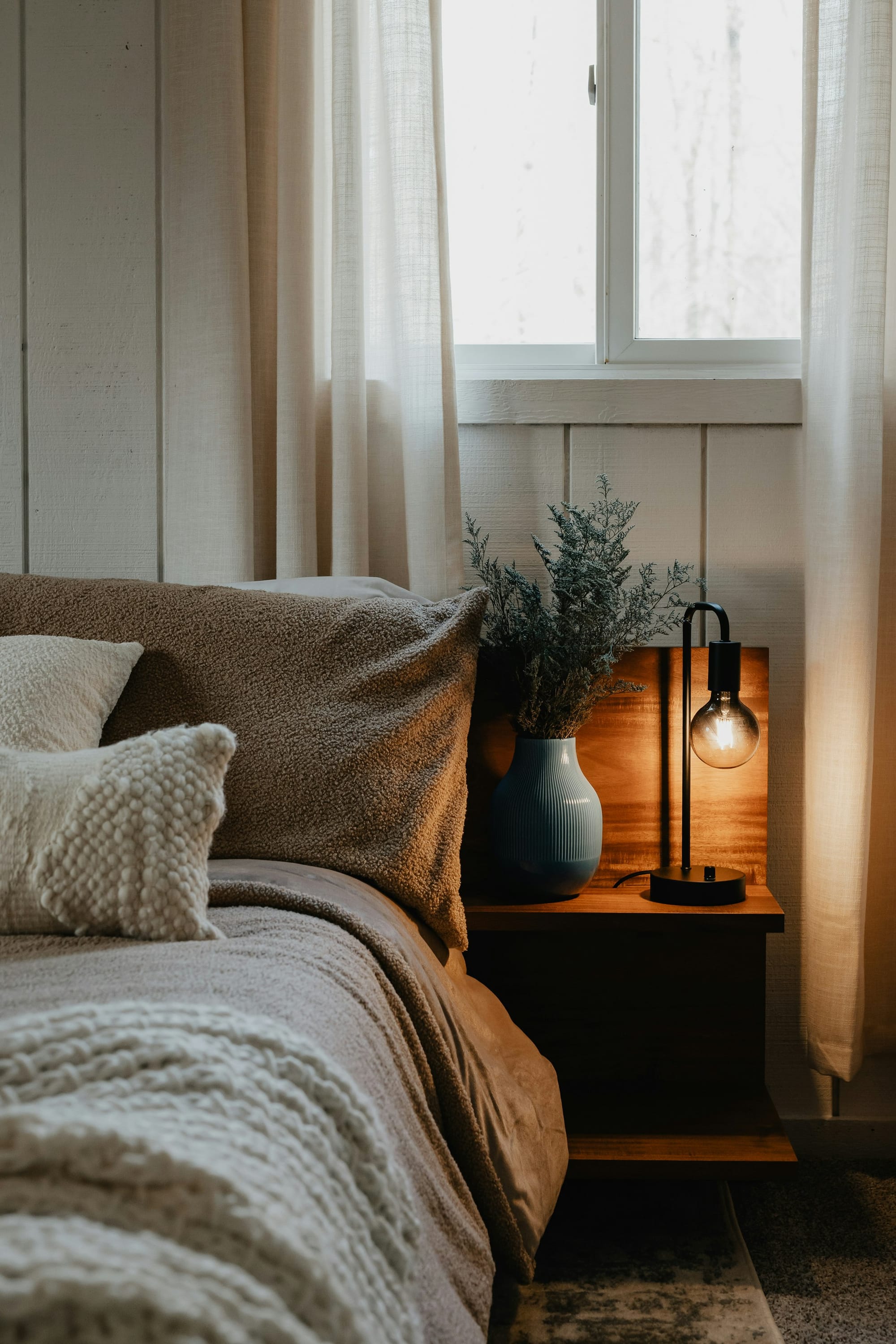Bedtime Routines for an Energized Morning
Establish a pre-sleep routine to improve sleep quality and wake up energized with practical tips and insights.

Want to wake up full of energy? It starts with a solid nighttime routine. Here’s a quick guide to help you sleep better and feel more alert in the morning:
- Stick to a schedule: Go to bed and wake up at the same time daily, even on weekends.
- Dim the lights: Reduce blue light exposure in the evening to boost melatonin production.
- Relax before bed: Try meditation, light stretching, or reading a book to wind down.
- Optimize your bedroom: Keep it cool (60-67°F), dark, and quiet for better sleep.
- Try delayed-release caffeine: Take it 7-8 hours before waking to reduce grogginess.
Bonus tip: Morning sunlight exposure for 10+ minutes resets your internal clock and boosts energy. Ready to upgrade your mornings? Let’s dive into the details.
Steps to Prepare for Better Sleep
Improve your sleep by aligning your evening activities with your body's natural rhythms. Here are some simple, practical steps to help you wake up feeling refreshed.
Sync with Your Sleep-Wake Cycle
Your circadian rhythm, which controls your sleep-wake cycle, is influenced by light exposure. Hormones like melatonin and serotonin play a key role in this process [1]. Start your day with at least 10 minutes of sunlight to help regulate this cycle.
| Time of Day | Light Exposure Tip | Benefit |
|---|---|---|
| Morning | Spend 10+ minutes outside in sunlight | Helps kickstart your natural wake cycle |
| Evening | Use dim lighting or blue light filters | Encourages melatonin production for better sleep |
Create a Relaxing Evening Routine
The way you wind down in the evening directly impacts how well you sleep [1]. Consider calming activities like light stretching, meditation, reading a physical book, or listening to soothing music to prepare your body and mind for rest.
Design a Sleep-Friendly Environment
Your bedroom setup plays a huge role in the quality of your sleep. Factors such as temperature, lighting, and noise all contribute to how well you rest. Experts recommend keeping your bedroom between 60°F and 67°F (15.5°C-19.4°C) to support your body's natural cooling process [1].
Here’s how to optimize your sleep space:
| Factor | Ideal Setting | How It Helps |
|---|---|---|
| Temperature | 60-67°F (15.5-19.4°C) | Helps your body cool down naturally |
| Lighting | Total darkness | Promotes melatonin production |
| Noise | White noise or complete silence | Reduces interruptions during sleep |
| Air Quality | Well-ventilated room | Improves oxygen flow for better rest |
Using Delayed-Release Caffeine for Mornings
Adding delayed-release caffeine to your nighttime routine can help you wake up with more energy. This method works with your body's natural sleep-wake cycle to reduce morning grogginess.
How Delayed-Release Caffeine Works
Delayed-release caffeine uses a special capsule design to release caffeine about 7-8 hours after you take it. Unlike drinking coffee or tea in the morning, this timing ensures the caffeine kicks in just as you're waking up.
Stanford neuroscientist Andrew Huberman highlights that delaying caffeine intake avoids disrupting adenosine buildup - a key process for good sleep. Delayed-release caffeine works with this idea, activating only when your body is ready for wakefulness.
Morning Benefits of Delayed-Release Caffeine
Research highlights several benefits of delayed-release caffeine:
- Reduces morning grogginess by up to 90%
- Delivers steady energy without sudden crashes
- Improves focus and reaction times, backed by clinical studies
Delayed-release caffeine boosts morning alertness and reduces sleepiness, even for those who are sleep-deprived. Its gradual release helps avoid the jitters and anxiety that can come with regular caffeine.

The Zest Labs wake-up pill combines delayed-release caffeine with nutrients like Vitamin B5, B12, and Zinc. It's vegan, non-GMO, gluten-free, and clinically tested to improve alertness when taken 7-8 hours before you wake up.
While delayed-release caffeine is effective on its own, pairing it with other sleep-friendly habits can make your mornings even better.
Other Tools and Habits for Better Sleep
Explore Sleep-Friendly Tools
Devices like the Philips SmartSleep wake-up light mimic a sunrise, helping your body wake up more naturally and feel alert in the morning. White noise machines, such as LectroFan, can block out disruptive sounds, making it easier to stay asleep.
Meditation apps like Headspace, Calm, and Insight Timer offer guided meditations and sleep stories designed to help you unwind. Studies suggest these tools can help you fall asleep faster and enjoy deeper, uninterrupted rest.
Consider Relaxation Aids
Magnesium Glycinate (200-400mg daily) is known for its ability to relax muscles and ease stress when taken 1-2 hours before bed. Chamomile tea is another option; it interacts with brain receptors that help reduce anxiety. Drinking a cup 45-60 minutes before bedtime can set the stage for relaxation.
Stick to a Consistent Sleep Routine
Keeping a regular sleep schedule - going to bed and waking up at roughly the same time every day - helps regulate your body's internal clock. Even on weekends, try to stay within a 30-minute window. If you're a shift worker or frequently travel, sleep calculators can guide you in finding the best sleep times based on your schedule.
Some key tips include:
- Establish a firm bedtime
- Start winding down an hour before sleep
- Use reminders to stay on track
Combining these tools and habits with strategies like delayed-release caffeine can help reduce grogginess in the morning and boost your energy levels. Together with earlier methods, these practices can help you build a well-rounded approach to better sleep and energized mornings.
Summary of Key Tips
Creating a pre-sleep routine based on proven strategies can improve your sleep quality and help you wake up feeling refreshed. By aligning with your natural sleep-wake cycle, establishing a relaxing evening routine, and fine-tuning your sleep environment, you set yourself up for better mornings.
Stick to a consistent bedtime and wake-up schedule, keeping it within a 30-minute range - even on weekends. This consistency helps your body wake up naturally and feel more alert [1]. Spend the hour before bed on calming activities like reading or meditation to signal your brain it's time to wind down. Your bedroom setup also plays a big role: keep the temperature cool (around 60-67°F), block out light completely, and reduce noise as much as possible.
For an extra boost in the morning, delayed-release caffeine can help combat grogginess and improve focus. The Zest Labs wake-up pill blends this technology with vitamins B5, B12, and zinc to support energy levels.
Beyond caffeine, other tools and supplements can support better sleep and mornings:
| Tool Type | Recommended Options | Benefits |
|---|---|---|
| Light Therapy | Philips SmartSleep | Encourages natural wake-ups |
| Sound Management | LectroFan | Minimizes sleep interruptions |
| Relaxation Apps | Headspace, Calm | Enhances relaxation |
| Natural Supplements | Magnesium supplements | Helps with relaxation |
Pairing these tools with a consistent routine can make restorative sleep more attainable. Another helpful tip? Morning light exposure (discussed earlier) signals your body to wake up and feel energized [1].
Consistency is key to supporting your sleep-wake cycle [1][2]. By combining these strategies into your nightly routine, you can build habits that lead to productive, energized mornings.
FAQs
How to wake up fully energized?
Feeling energized in the morning depends on both your nighttime routine and what you do as soon as you wake up. Start by drinking water to rehydrate your body, which helps boost energy. Adding simple stretches or going for a short walk can improve blood flow and make you feel more awake.
Morning light exposure is another key factor - it helps regulate your body’s internal clock. Using tools like the Philips SmartSleep wake-up light, which mimics a natural sunrise, can make getting out of bed feel easier and more natural.
How do I wake up feeling full of energy?
Waking up with energy begins the night before. Stick to a consistent sleep schedule and follow these steps in the morning:
| Time | Action | Benefit |
|---|---|---|
| Immediately | Drink water | Rehydrates your body |
| First 5 minutes | Light stretching | Boosts circulation |
| Within 30 mins | Get natural light | Regulates your body clock |
| First hour | Eat a light breakfast | Sustains energy levels |
To keep your energy steady, avoid sugary foods until lunchtime. If morning grogginess is an issue, you might experiment with delayed-release caffeine supplements taken before bed to help you feel more alert upon waking.
How to avoid sleep inertia?
Sleep inertia, or that groggy feeling in the morning, can be managed with a few simple strategies. Using light therapy or keeping your bedroom cool (between 60-67°F) can make waking up feel smoother and more natural.
Once awake, drink a glass of water and do some light stretches to rehydrate and get your blood flowing. Movement - like walking or stretching - can increase your heart rate and help shake off that grogginess.
If you still feel sluggish, try short breathing exercises or meditation to help your brain transition from rest to full alertness. A consistent sleep schedule also plays a big role in reducing sleep inertia by syncing with your body’s natural rhythms [1][2].





